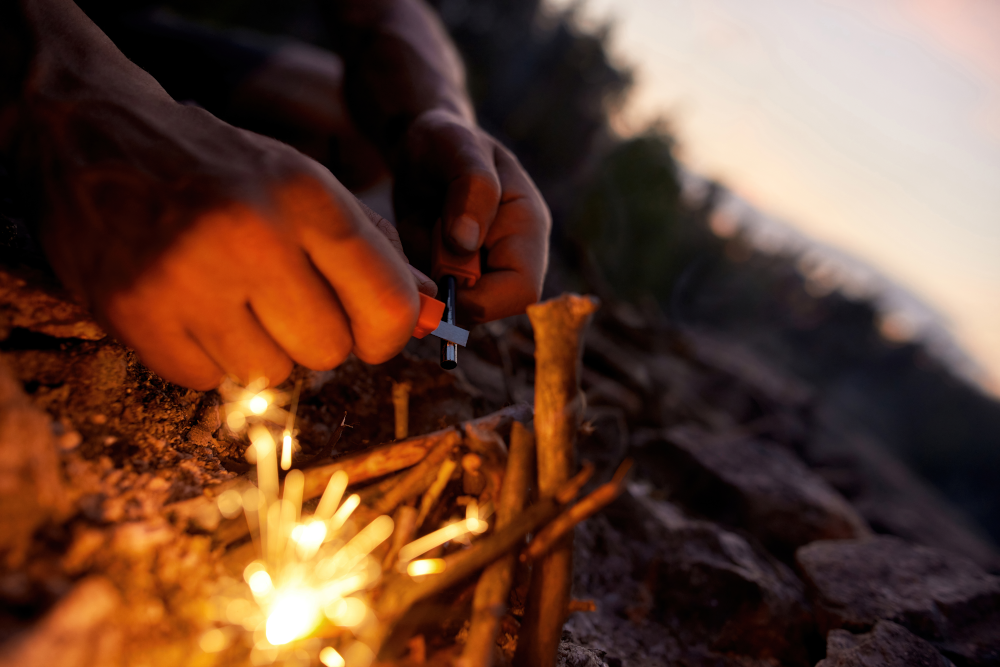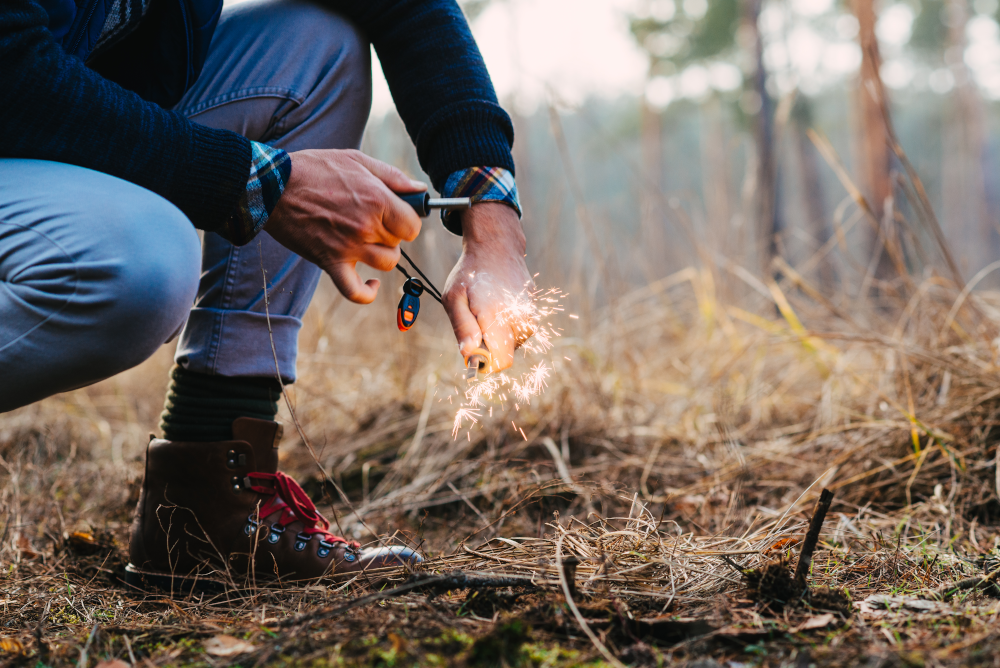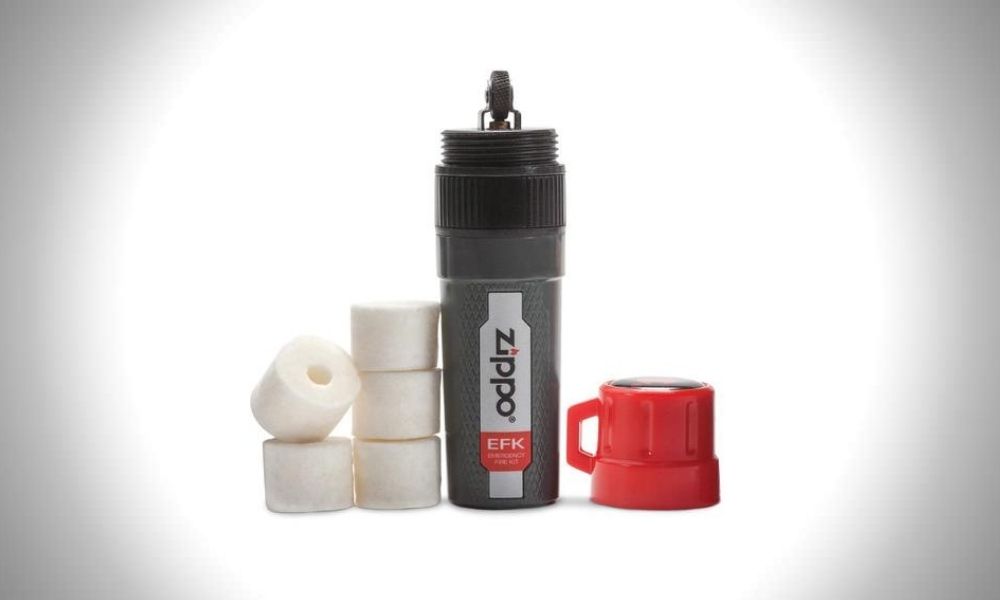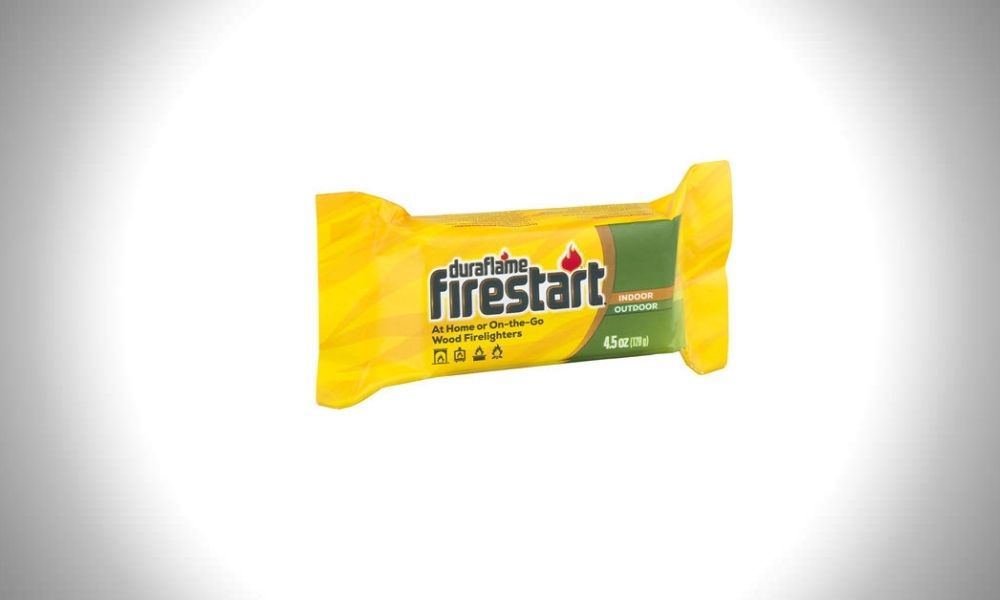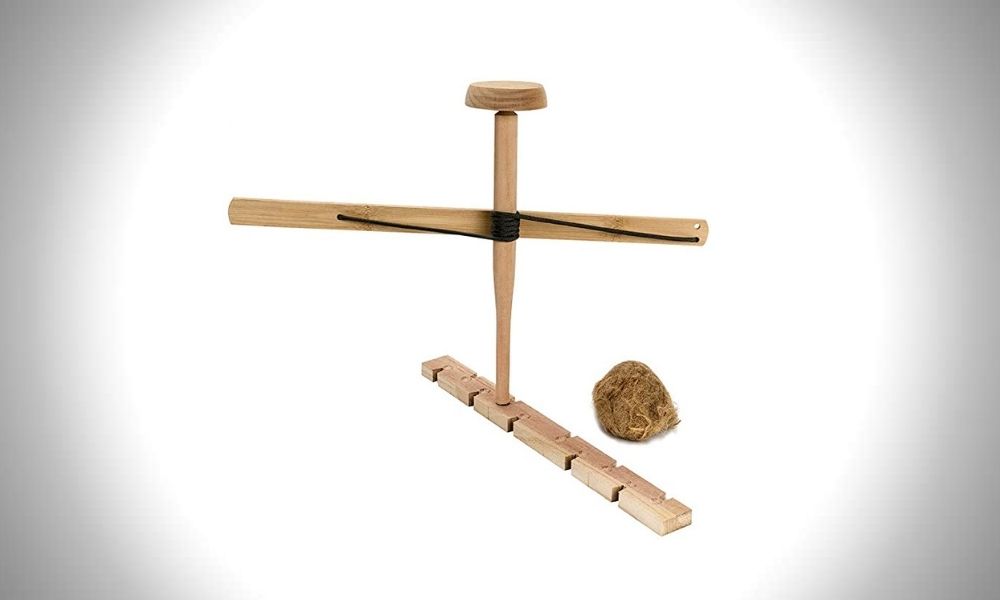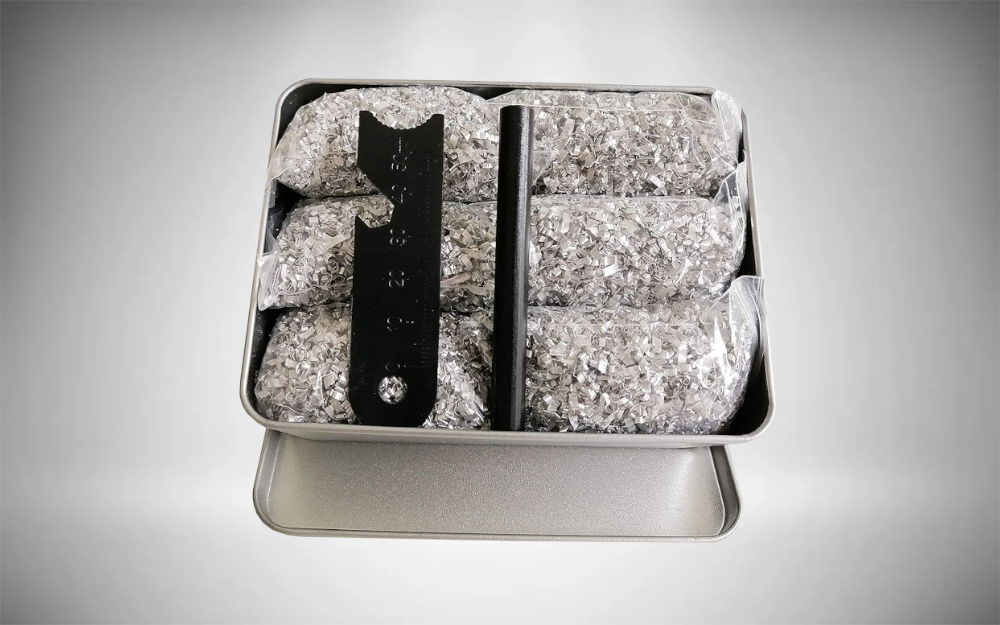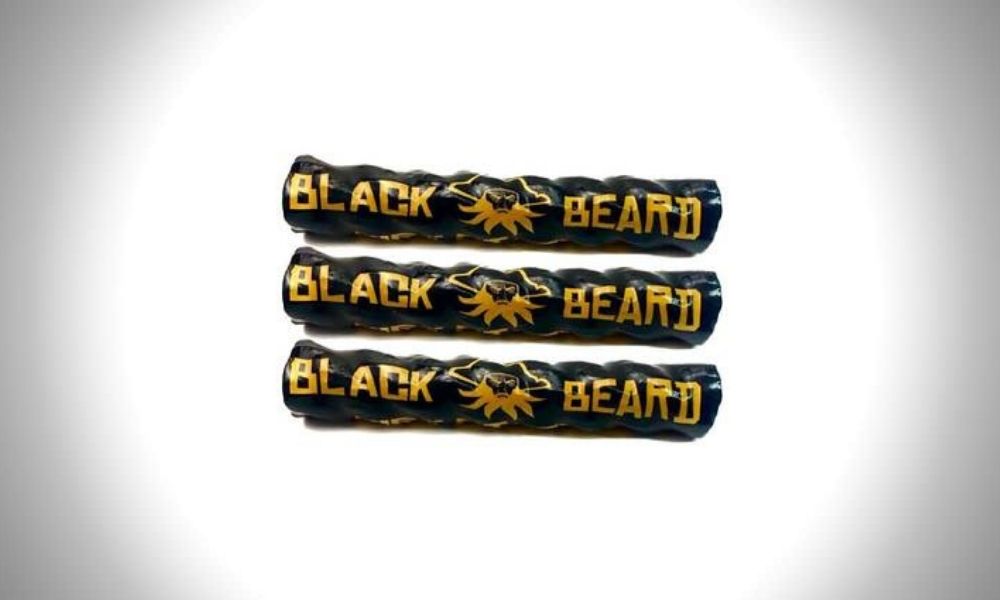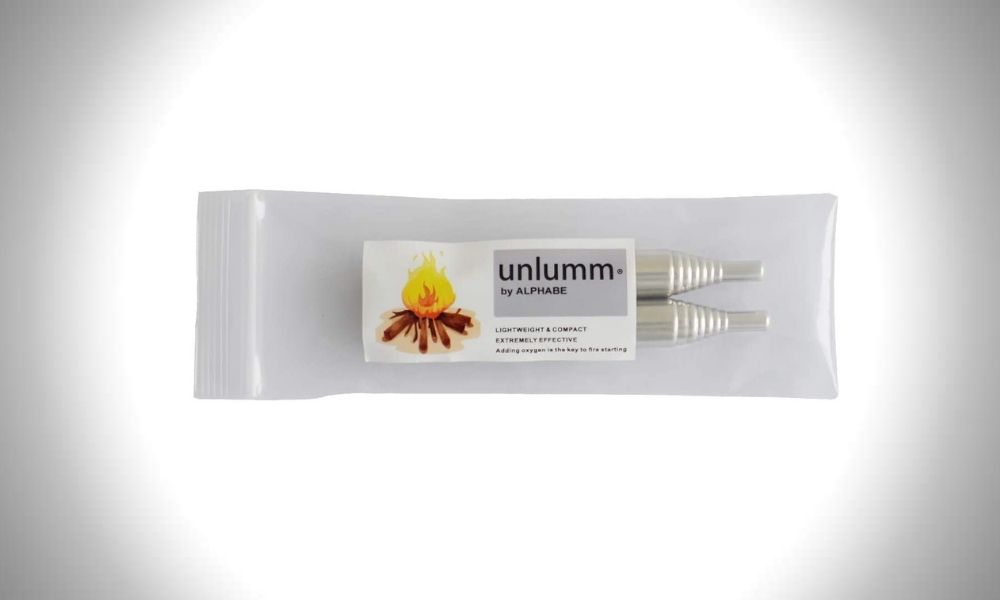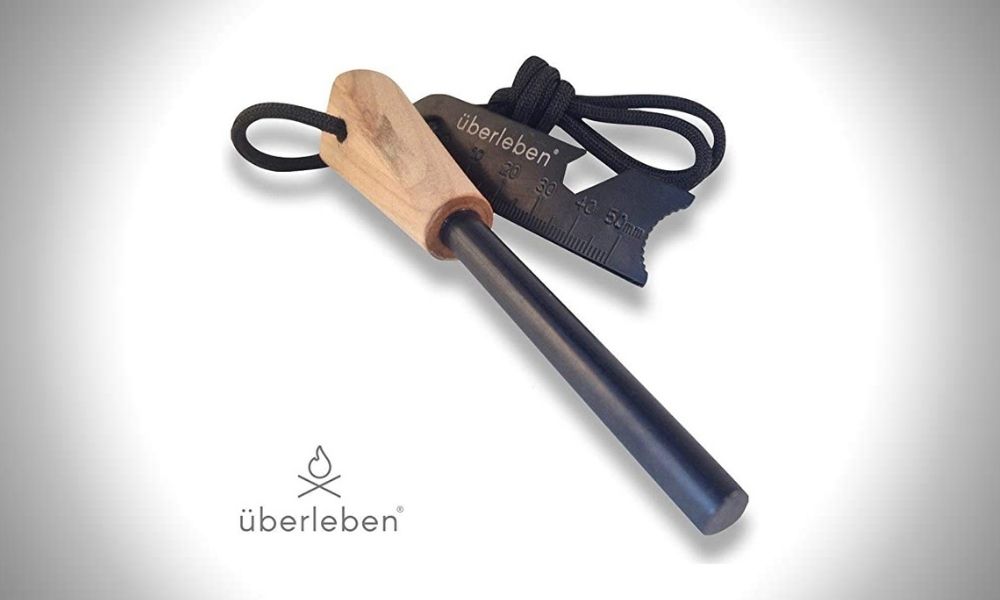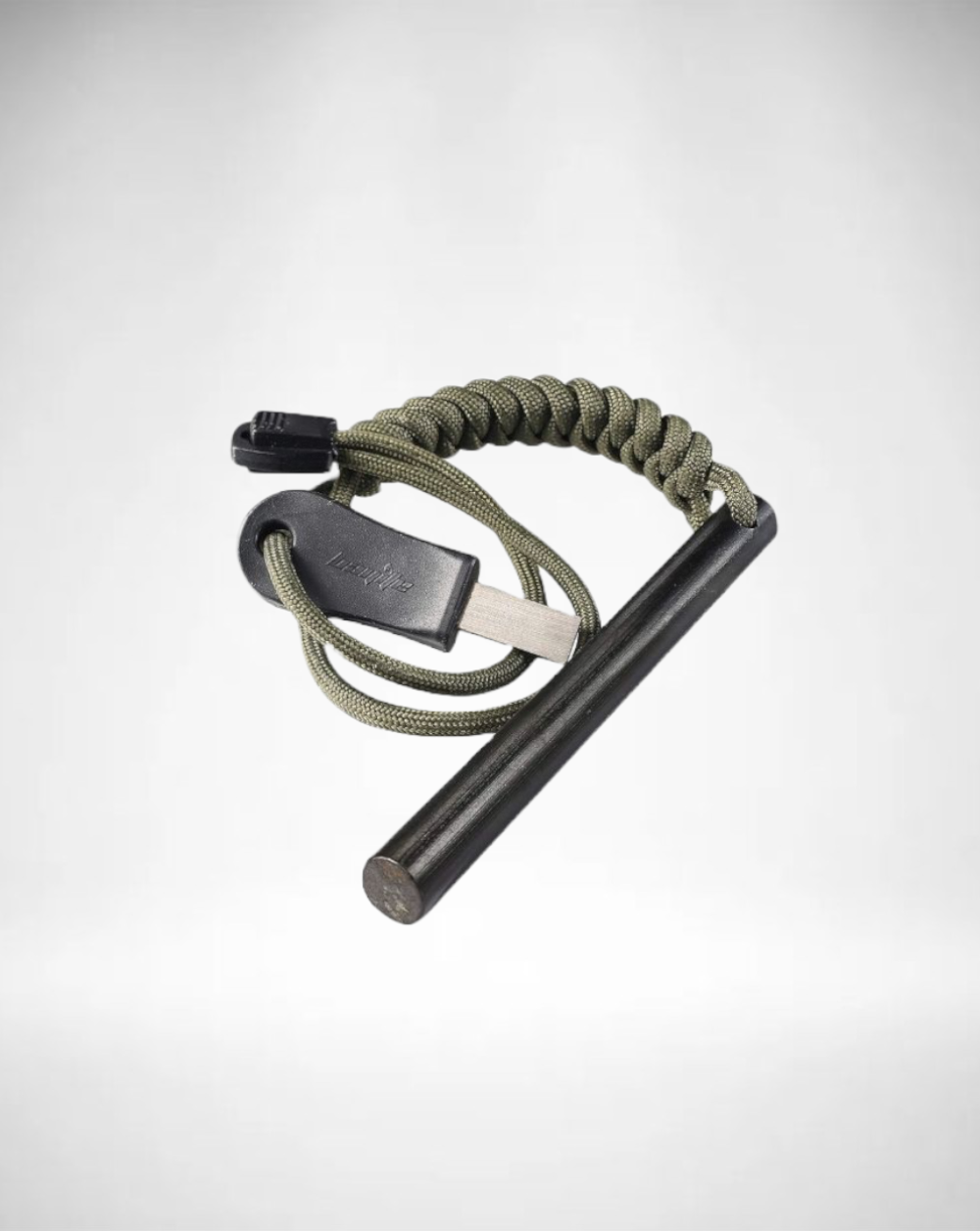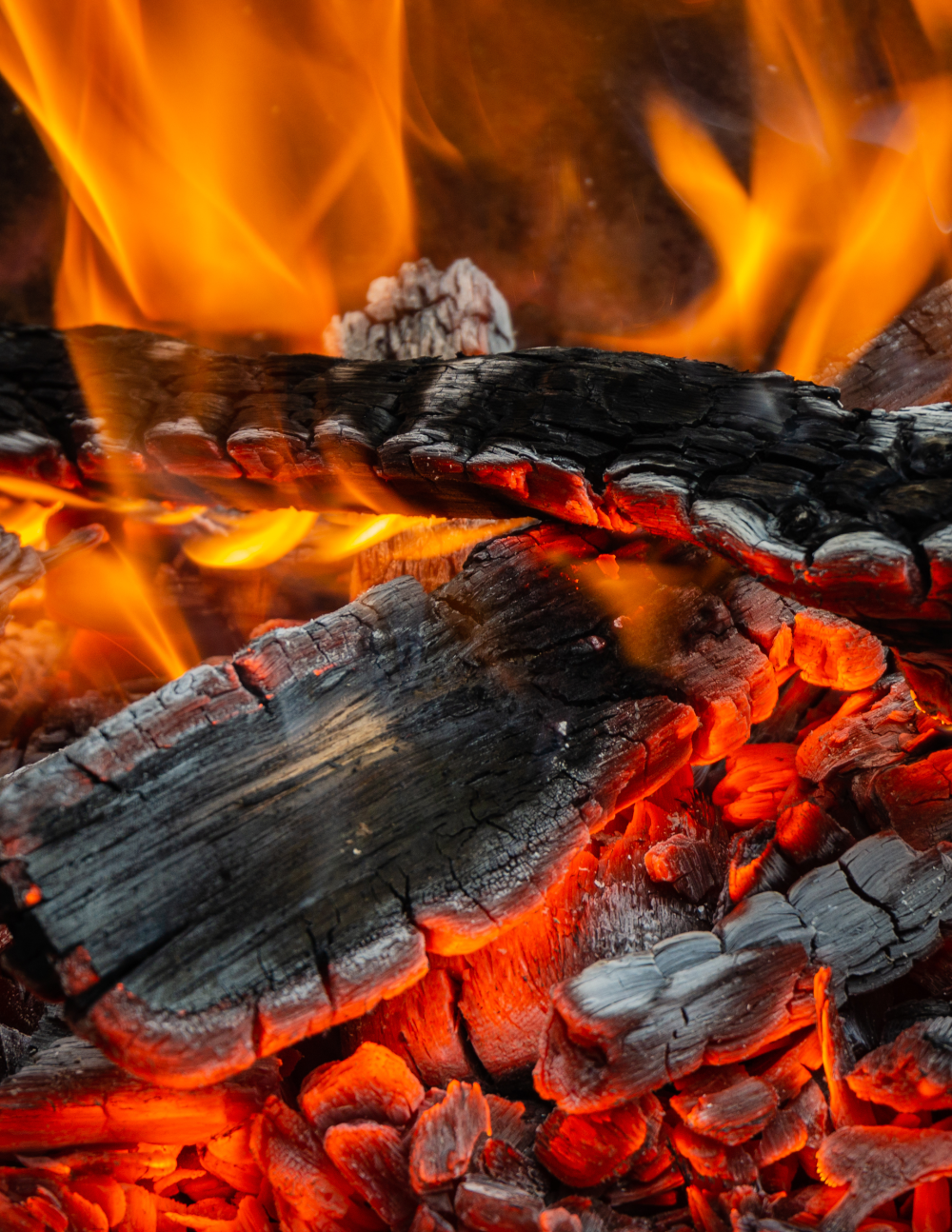Novice campers would likely dive for a couple of rocks and try to get a spark. But starting a fire is not so simple. While friction fires can be lifesaving and only require natural materials, this primitive method of starting a fire is not as reliable as the movies make it out to be. Fortunately, there are modern methods that leverage these age-old fire-starting techniques but use streamlined, easy-to-use tools. You will learn about the best of them in our guide below.
8 of the Best Fire Starters for Outdoor Enthusiasts
Starting a fire in windy, rainy, or damp conditions can dishearten if all you have is a lighter or a box of matches. You can easily go through tens of match tips and not have any fire to show for the effort. The fire starters below can keep you frustration-free and warm in the great outdoors — regardless of conditions.
1. Bayite 4 Inch Survival Ferrocerium Drilled Flint Fire Starter
While there is magic and satisfaction in making a fire using primitive techniques, friction fire is difficult to produce. If you want to ditch that Bic lighter or match tips for flint and steel, you first need to take some lessons from the masters on YouTube. That said, good old book learning will only get you so far if you don’t have the right flint at hand. The Bayite 4-inch flint fire starter is an effective, straightforward tool for the aspiring survivalist. An ideal camping fire starter, the Bayite Ferrocerium rod can ignite sparks in any weather. This alloy’s sparks can burn at temperatures as high as 5,430°F (3,000°C), making it a convenient ignition source in adverse conditions. Ferro rods have the same ignition mechanism as carbon-rich steel and flint. The Bayite Ferrocerium rod burns and produces sparks at any altitude and any setting. You can use this budget-priced fire-starting tool for your BBQ, camp stoves, or bushcraft tinder fires. Its 4-inch-long Ferro rod will last a long time and is convenient to carry around in the backcountry. Its tool-grade, high-speed steel striker is rock-hard, and easily creates a shower of sparks in the absence of a quality knife. The long-woven paracord attaches the striker to the rod, securing it to your luggage and giving your hand a firm grip when starting a fire.
2. überleben Zünden Fire Starter
Whether your lighter is out of fuel or the weather is too damp, sometimes the best fire lighting plans go awry. The old steel-and-flint combo, like this überleben Zünden fire starter, can be a lifesaver in such scenarios. Friction fire from this tools can turn firewood into smoldering coals in any weather condition. All you need to do is hit your multi-tool steel striker against Überleben’s Sånft-korr (TM) ferrocerium rod and get a fire going. Its molten sparks will hit temperatures as high as 5,500ºF and are waterproof. This fire-starting tool also has a handy hardwood handle handcrafted for top-notch ergonomics. The handle comes with a long paracord at the end, so you can slip it on and let it hang around your neck for convenience. überleben Zünden Ferrocerium rods come in a wide range of thicknesses. The Fatty 1/2″ will give you over 20,000 strikes, while the Pro 3/8″ will last for 15,000 strikes. The Trad 5/16″ can produce 12,000 plus strikes before wearing out.
3. Unlumm Pocket Fire Bellow
The Unlumm Pocket Fire Bellow can be an asset when you need to stoke a dying fire back to life. If tiny embers are all you have left in your campfire or wood stove, don’t fret. These durable pocket bellows can turn your embers into a large or medium fire in minutes. Bellows are an ancient method of starting fires. With them, you needn’t get down on all fours to huff and puff all over dying embers. With these bellows, all you needs to build a warm fire is heat, wood, and oxygen. The Unlumm Pocket Fire Bellow will focus the air you breathe out onto a heat source to kindle the fire. These little pocket-friendly bellows come in a convenient 2-pack. They can extend to a lengthy 20-inch size thanks to their 8-layer, telescopic structure. Once you have a fire going, you can push them back to their portable 3.5-inch size. To start a fire, place the bellows’ small end next to hot coals, then blow air through them. They will spark both dry and wet firewood. Make them a part of your fire kit and they will not disappoint. For added durability, these bellows feature a stainless steel finish that will not rust after long-term exposure to moist conditions.
4. Black Beard Fire Starter
Survivalists often go for flint or metal tools when planning their emergency fire starter kits. But many outdoor enthusiasts want a simpler solution — a tool they could whip out and start a fire with minimal effort. If you are looking for an easy, less gritty survivalist tool, go for the Black Beard fire starter. It’s an ideal fire starter for both indoor and outdoor settings. The Black Beard fire starter is handcrafted, windproof, and waterproof — it can ignite a fire in almost any weather. Its combustible material comrpises a cotton rope base that the good people at Black Beard infuse with non-toxic and odorless oils and waxes. This fire starter rope is, therefore, safe to use in any setup and easy to handle. A single pack has 33 strands of this highly combustible rope. Each pack can smolder for 4.5 hours, creating over 50 fires. This easy-to-use fire starter product does not have an expiration date. To use the Black Beard fire starter, snip off a chunk of the flammable fiber, roll it on your hand, then form a ball by bunching and separating the fibers. Light the Black Beard fire starter rope using a lighter or Ferro rod, then build a fire.
5. Emergency Fire Starter Magnesium
If you’ve paid attention during science class demonstrations, you would’ve seen magnesium burn in the air in a blinding ball of fire. All you had to do to start a magnesium fire is to use a Bunsen flame. It’s this simplicity that makes magnesium a popular fire starter amongst survivalists, campers, and military personnel. The magnesium shavings included in this package are reliable, cheap, and waterproof. They are a first-class alternative to lighters or matches. To ignite a fire using these shiny chips, locate the fuel source first. Kindling and dry grass are excellent materials. Next, hit the ferrocerium fire rod with the striker to produce sparks; these will light the magnesium shavings, combusting to temperatures above 5,610 ºF, and help light the fuel source. The resulting flames will burn through your twigs and leaves fast, so make sure you have larger logs to feed the fire as it grows. The magnesium in this Emergency fire starter kit is high quality and 99.99% pure. The shavings can combust in cold, windy, wet, or humid weather.
6. SXTL Flat Head Bow Drill Fire Starter Kit
Making a fire by rubbing sticks together is a fascinating survival skill. Learning this art will help you reconnect with the simple outdoors and bring immense satisfaction. The SXTL flat head bow drill has all the basic items that you need to build a fire. This friction fire, beginner-friendly tool comes with an instruction manual for use. Its handle and socket are made from premium bamboo material that lessens finger and palm bruises. The package includes a spindle, bow, string, and tinder. Igniting a spark using a bow drill takes effort, but is manageable as long as you use the right techniques and have patience.
7. Duraflame Firestart® Indoor/Outdoor Firelighters
Firestarter logs are easy to use and come in a variety of shapes and sizes. You can use them when you want a quick fire, whether its for an outdoor fire or in a fireplace. They are a compact blend of wax, paper, and wood. The Duraflame Firestart firelighters — some of the best fire starter logs on the market — are water-resistant, so they will combust in moist environments. To ignite these logs, all you need is a single match. Each Duraflame log will burn for 30 minutes, giving the most resistant of logs ample time to warm up. A Duraflame Firestart pack comes with 12 lighters. To build a roaring fire, place the fire starter log in the middle of a heap of firewood, light its wrapper, and let it burn. Users love that these useful fire starters are small and easy to carry.
8. Zippo Emergency Fire Kit
The Zippo Emergency fire kit is an impressive piece of emergency equipment. It’s the tool you need in the bleakest of conditions, when a fire is all that stands between you and freezing weather. You can rely on its high caliber build and trusty features to provide a spark under any atmospheric conditions. This fire kit has a well-thought-out design that keeps it waterproof, is easy to use, and is self-contained. To use the kit, simply pull its tinder roll out and then push it onto a stick. Then, use the flint wheel in the package to produce a spark. The outer package has a hardy ABS plastic construction that keeps the whole assembly waterproof. It will also float in water, and its O-ring feature will keep the wetness and humidity out of the kit. To ease portability, the Zippo Emergency fire kit has a lanyard hole; you can attach a clip or lanyard and secure it on your backpack.
Fire Starter Purchase Tips
View in gallery
Before you choose a fire starter for your next adventure, you should know which fire starter type you need. You should also consider a few factors to make sure the tool you purchase works the way you intend it to. Below, we’ll walk you through different fire starter types and selection criteria.
Types of Fire Starters
There are 3 main types of fire starters — fuel source, ignition, and combination kits. Fuel source fire starters are just that — a source of fuel that easily ignites with a spark, providing a stable flame to get wood or coal to catch fire. Fuel sources typically include nuggets, fatwood, magnesium, and fire bricks. Ignition starters produce the spark needed to ignite the fuel source. These devices generate sparks when Ferro rods are struck; or, by means of an electrical current. The combination kit type includes an ignition system as well as a fuel source.
View in gallery
Consider When Purchasing Fire Starters
When you choose your fire starter, be sure to consider the selection criteria below.
Ease of use
If you have no prior experience with tools such as flint and steel or a bow drill, you’ll have a few new techniques to learn. So, ideally, you’d buy a fire starter that’s made for novice users, and one that comes with an instruction manual. The last thing you want to be doing is trying to figure our how to use your device when you need a fire badly.
Intended use
If you are intending to include your fire starter in a survival kit, you will need an ignition and fuel combo fire starter. For your everyday fire pit, use with fireplaces, or lighting wood stoves, you can get simple lighters or fuel source fire starters.
Lasting power
To minimize the number of times you’ve got to buy a fire starter, choose one that lasts long. Take into account the number of strikes that the product can deliver before you need a replacement. Also, be sure to study reviews to ensure that the manufacturers’ claims are accurate.
Reliability
A fire starter may be designed to last for 10,000 strikes, but if it doesn’t work properly after a while, you may be stuck without a fire in the wild. Depending on where you are, there may not be a store within driving distance that has fire starters, or alternatives, in stock. So, be sure to read up on reviews and verify that the product you’re about to buy is reliable.
Size
For the best portability, you want a fire starter that’s compact and light. That said, a tiny product might have low firepower and is also easier to lose when out in the wild. It’s a balance — look for the perfect size that is neither too small nor big.
Odor
An odorless, chemical-free fire starter is ideal if you plan to use it indoors. The best products are “green,” making use of non-toxic wax, wood waste, and recycled fiber and paper.
Conclusion
Using modern fire lighting tools makes the outdoors a more comfortable place. At the end of a long day, you can go back to camp and enjoy the comfort of a fire and hot food. All you need are a few tinder scraps and a trusty fire starter. We hope that this guide will help you find the best fire starter for your next adventure. As we wrap up, is there anything we missed? Have you used any of the fire starters we’ve listed here, or any other? If so, what was your experience like? Please leave us a comment below!
